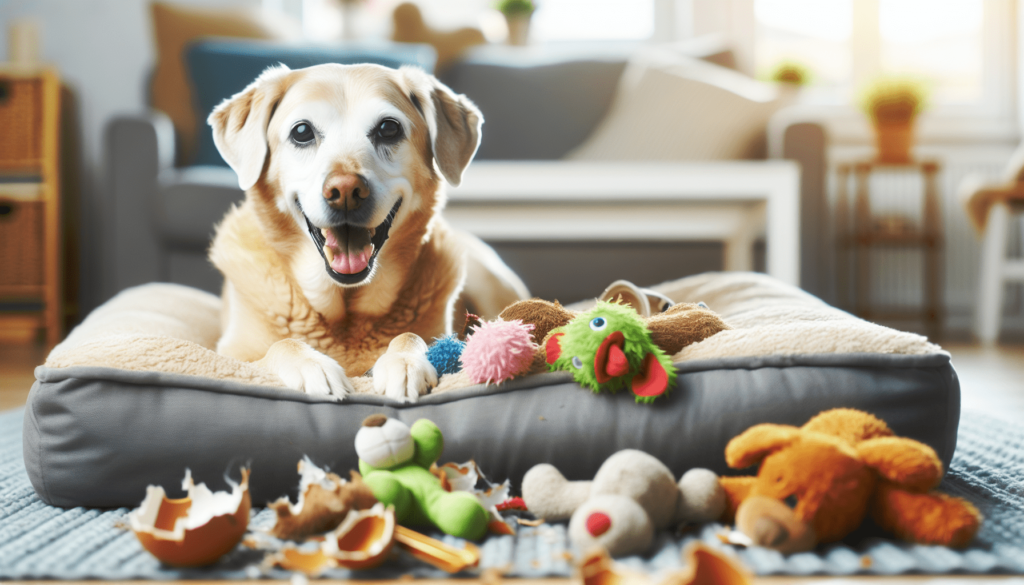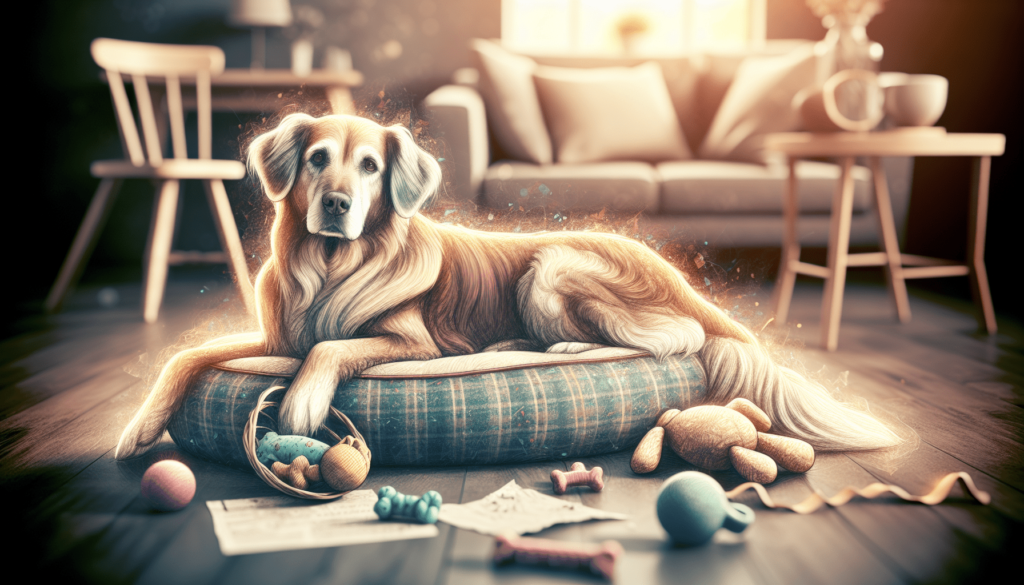What can you do to help your senior dog curb their destructive habits?
As our dogs age, their behavior can change, and sometimes, those changes manifest as less-than-ideal habits.
Don’t worry; you’re not alone in navigating this challenge.
Many senior dog owners find themselves unsure of how to manage destructive behaviors in their beloved companions.

Understanding Your Senior Dog’s Behavior
Why Do Senior Dogs Develop Destructive Habits?
As dogs grow older, various factors can lead to changes in behavior. Health issues, cognitive decline, or even anxiety can cause them to act out.
For instance, conditions like arthritis may make it challenging for them to play or move as they once did, leading to frustration that could result in destructive habits.
Understanding the root cause is essential for addressing the behavior effectively.
What Are Common Destructive Habits in Senior Dogs?
Senior dogs may exhibit a range of destructive habits, including excessive barking, chewing, or even having accidents indoors.
These behaviors might stem from boredom, pain, or cognitive issues like canine cognitive dysfunction syndrome (CDS), which is similar to Alzheimer’s in humans.
Recognizing these habits is the first step toward helping your furry friend.
How Can Physical Health Affect Behavior?
Physical health has an undeniable impact on behavior.
If your dog is in pain due to arthritis or other health issues, they may act out by chewing on furniture or digging.
Regular veterinary check-ups can help identify and manage any physical health issues your dog may be facing.
What Role Does Mental Stimulation Play?
Mental stimulation is crucial, especially for senior dogs who may not be as active as they once were.
Engaging their minds with puzzles or training exercises can keep their cognitive functions sharp and reduce boredom-related destructive behaviors.
Establishing a Routine
How Important Is a Daily Schedule for Your Dog?
Creating a daily routine can provide a sense of security for your senior dog. Just like humans, dogs thrive on consistency.
Having set times for meals, walks, and play can help alleviate anxiety and reduce destructive behaviors.
A predictable routine helps your dog know what to expect, which can decrease their stress levels.
What Activities Should You Include in Their Routine?
Think about incorporating a mix of physical and mental activities into your dog’s daily schedule.
Short but frequent walks, gentle playtime, and interactive puzzle toys can keep them engaged and happy.
The combination of physical exercise and mental stimulation is key to curbing destructive habits.
How Can You Adjust the Routine as They Age?
As your dog ages, their energy levels and physical capabilities may change. You may need to modify their routine gradually.
This change can be as simple as offering shorter walks more frequently instead of longer ones or introducing gentle stretching exercises.
Pay attention to your dog’s reactions and adjust accordingly.
Should You Incorporate Training into Their Routine?
Absolutely! Training doesn’t have to stop just because your dog is older. In fact, it can be incredibly beneficial.
Teaching them new commands or reinforcing old ones can enhance their confidence and reduce stress.
Short training sessions can fit seamlessly into their routine, keeping their minds sharp and focused.
Providing Appropriate Outlets
What Chewing Options Are Best for Senior Dogs?
Choosing the right chew toys can significantly influence your dog’s chewing habits. Look for soft, durable toys designed for older dogs.
Rubber toys filled with treats or softer options made of fabric can provide your dog with satisfying chewing experiences while being gentle on their teeth.
How Can You Redirect Destructive Behaviors?
If you catch your dog engaging in destructive behavior, gently redirect them to an appropriate activity.
Use toys or engaging activities to distract them.
For instance, if your dog starts chewing on furniture, guide them towards their chew toy instead.
Consistency is essential in reinforcing this redirection.
Are There Specific Games That Suit Senior Dogs?
Certain games can be particularly enjoyable for senior dogs.
Adapt traditional games like fetch to suit their abilities, perhaps by rolling a ball instead of throwing it.
Hide-and-seek with treats can also be engaging, providing mental challenges while keeping it light and fun.
How Can You Use Positive Reinforcement Effectively?
Positive reinforcement is one of the most effective training methods.
When your dog chooses to chew their toys instead of your favorite slippers, reward them with praise or a small treat.
This method encourages desired behaviors and makes training a positive experience for both of you.
Addressing Health Concerns
How Do You Know When to Consult a Vet?
Frequent or severe destructive behaviors may indicate underlying health issues.
If you notice sudden changes in behavior, it’s crucial to consult your veterinarian.
They can rule out health issues like pain, cognitive decline, or other medical conditions contributing to your dog’s behavior.
What Health Issues Are Common in Senior Dogs?
Several health problems often affect older dogs, including arthritis, dental disease, and cognitive dysfunction syndrome.
Ensuring regular check-ups can help catch these issues early, leading to effective management and a better quality of life for your dog.
Can Medications Help Manage Behaviors?
In some cases, medication can assist in managing behavioral issues related to anxiety or cognitive dysfunction.
If your vet recommends medication, make sure to combine it with enrichment activities and behavior modification techniques for the best results.
What Home Remedies Can You Try?
There are several home remedies you can consider to help your dog feel more comfortable.
Incorporating supplements like omega fatty acids can promote joint health and reduce inflammation.
Herbal calming aids may also help relieve anxiety but consult your vet before introducing any new treatment.

Creating a Comfortable Environment
How Can You Make Your Home Senior Dog-Friendly?
Making your home comfortable for your senior dog can minimize stress and destructive behaviors.
Consider adding non-slip mats to prevent slipping and choosing bedding that offers proper support for tired joints.
Should You Create a Safe Space for Your Dog?
Designating a quiet area where your dog can retreat to whenever they feel overwhelmed is essential.
It can be a cozy corner with their bed, toys, and blankets.
This safe space will be their sanctuary – a place where they can relax without feeling the pressure of the household activity.
How Can You Reduce Noise and Distractions?
Reducing noise levels and distractions can create a more calming environment for your dog.
Close windows during noisy times or use white noise machines to help mask sudden sounds.
Minor adjustments to your home environment can significantly influence your dog’s behavior.
Is a Comfort Object Helpful?
Many dogs find comfort in having security items such as a favorite blanket, stuffed animal, or a piece of your clothing.
These items provide a familiar scent that can soothe your dog and help them feel secure.
Engaging with Your Dog
How Can Bonding Activities Help?
Spending quality time with your dog through bonding activities can help emphasize positive behaviors.
Engage in gentle grooming sessions or simply sit together. Your presence reassures them and strengthens your bond, fostering a sense of trust.
What Are Fun Ideas for Interactive Play?
Interactive play doesn’t have to be strenuous.
Activities such as gentle tug-of-war with a soft toy or rolling a ball for them to nudge are excellent ways for you to interact.
These activities provide stimulation and reinforce your relationship through fun and play.
How Much is Too Much Exercise?
While keeping your senior dog active is important, knowing their limits is key.
Watch for signs of fatigue, such as excessive panting or reluctance to continue.
Balance short bursts of activity with ample rest and recovery.
Should You Encourage Socialization?
Socialization can be beneficial, even for senior dogs.
Arrange play dates with well-mannered dogs or participate in low-stress social outings.
These interactions can help maintain your dog’s mental health and reduce feelings of isolation.
Managing Anxiety
What Causes Anxiety in Senior Dogs?
Several factors can lead to anxiety in senior dogs, including changes in routine, loud noises, and separation from you.
Identifying triggers will make it easier to manage anxious behaviors.
How Can You Recognize Signs of Anxiety?
Common signs of anxiety include excessive barking, destructive chewing, or even house soiling.
Observing your dog’s body language can help identify when they are feeling overwhelmed or anxious.
What Techniques Can Help Reduce Anxiety?
Techniques like calming music, massage, and breathing exercises can create a tranquil environment. Ensuring your dog feels secure is vital in reducing their overall anxiety levels.
Should You Consider Training Classes?
Training classes can be beneficial for anxious dogs. Look for classes that focus on building confidence in a supportive environment.
These classes provide an opportunity for positive socialization, further reducing anxiety.
Frequently Asked Questions
- What are the most common destructive habits in senior dogs?
- Chewing, barking, and having accidents are often seen as destructive habits.
- How can I help my dog with anxiety?
- Consider creating a safe space, using calming music, and providing mental stimulation.
- What types of chew toys are safe for senior dogs?
- Soft rubber toys or plush toys designed for older dogs are generally safe options.
- How can I tell if my dog is in pain?
- Watch for signs such as reluctance to move, whining, or changes in eating habits.
- What activities should I include in my dog’s routine?
- Incorporate walks, gentle play, and interactive toys for mental stimulation.
- How often should I take my senior dog to the vet?
- Regular check-ups every 6 months are recommended for senior dogs to catch any issues early.
- What can I do for my dog with cognitive dysfunction?
- Engage them in mentally stimulating activities, and consult your vet for potential treatments.
- How can I make my home more senior dog-friendly?
- Use non-slip mats and provide comfortable bedding to create a safer environment.
- Is training still important for senior dogs?
- Yes, training can enhance their confidence and strengthen your bond.
- How can I keep my senior dog calm during storms?
- Use calming aids, maintain a quiet atmosphere, and create a secure space for them.
Conclusion
Curbing destructive habits in senior dogs is a journey that requires patience, understanding, and love.
By identifying the root causes, establishing a consistent routine, providing appropriate outlets, addressing health concerns, creating a comfortable environment, and engaging with your dog, you’re well on your way to fostering better behavior.
It’s essential to remember that every dog is unique, and what works for one may not work for another.
Regular observation, adapting your strategies, and maintaining open communication with your veterinarian will help you find the best approach for your beloved senior dog.
Now that you have the tools at your disposal, it’s time to take action. Implement these strategies step-by-step, and watch how your senior dog flourishes in a supportive, understanding environment.
Your journey together continues to be full of love, and with these essential tricks, you can navigate the challenges of senior dog ownership successfully.
